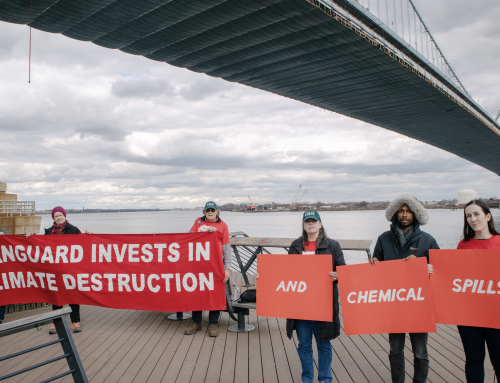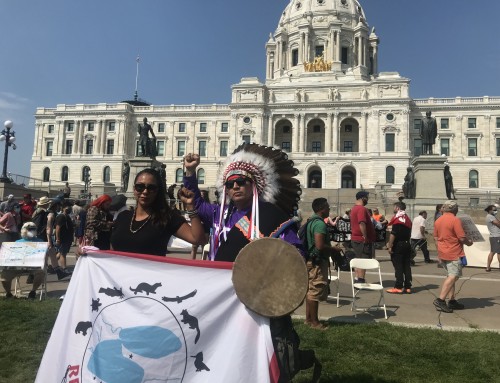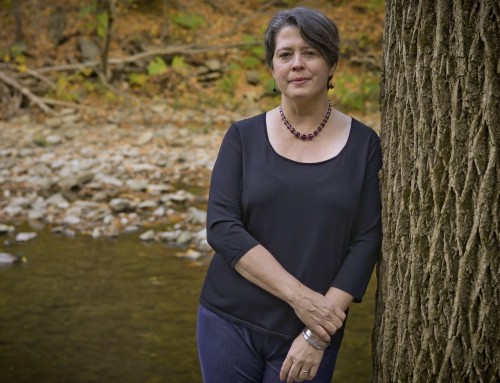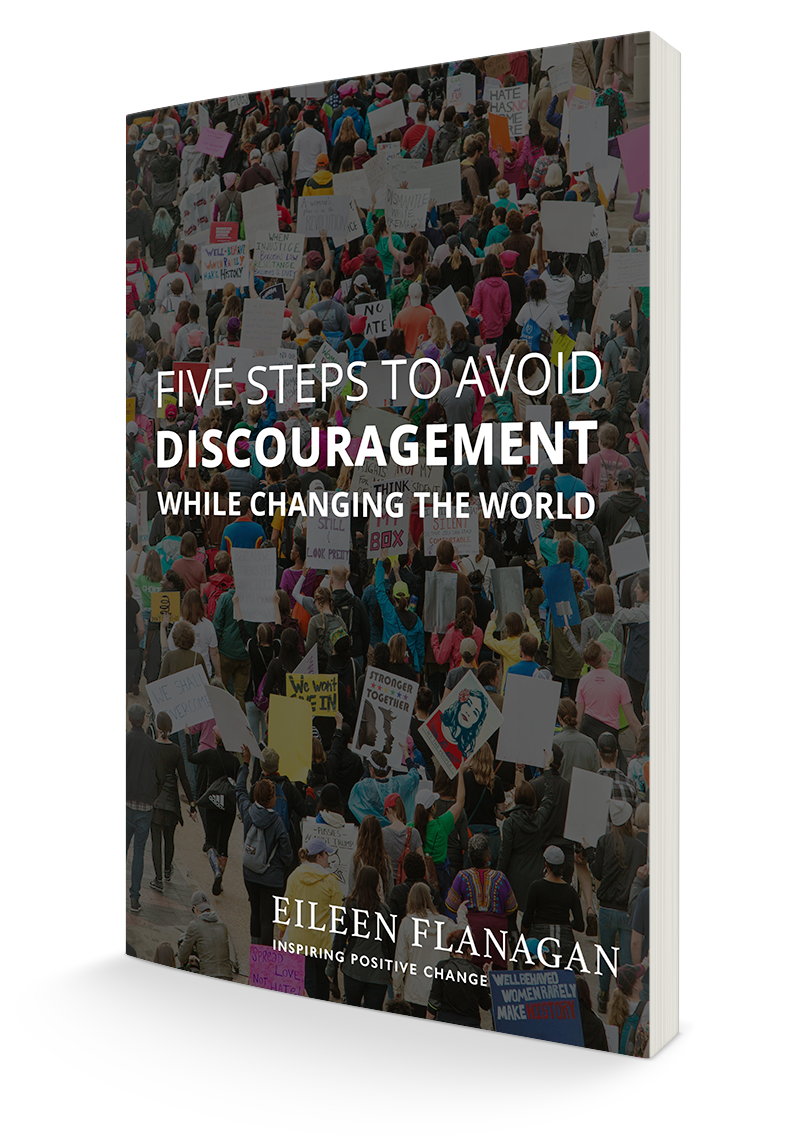
Shareholder team photo by Rachael Warriner
Yesterday morning I put on my nicest business dress, a little bit of mascara and joined Earth Quaker Action Team in Wilmington, DE for the annual shareholder meeting of Exelon, the parent company of our electric utility, PECO. We came to disrupt business as usual with the message that PECO is failing to transition to a just and sustainable energy future, and as the responsible parent, Exelon needed to address PECO’s poor performance. My role was action lead, the person who grounded the group at the beginning and decided when to leave the meeting, since getting arrested out of state was not part of the plan.
While a larger group outside rallied and sang, seven of us went inside the hotel conference room where Exelon executives, board members, and shareholders were gathering. We had planned who would speak and in what order. We had a script and a few signs. We also knew that direct action is unpredictable, so I had encouraged people to trust their inner guidance, God, or whatever they believed in as they figured out when to stand up to say their lines from different parts of the room.
I was glad I had said this, as things did not go quite as expected.
Long story short, Exelon had planned for our presence, sprinkling several Q & A opportunities throughout the meeting. When the first EQAT member, Carolyn McCoy, rose to deliver her message, the board chair asked her to just wait a minute and use the microphone, which had been positioned in the center aisle. It seemed to me this was meant to create a dilemma for us: either follow their rules, or look completely unreasonable, as they positioned themselves as the reasonable people.
It was a smart move on their part. Perhaps they had talked to PNC executives and heard how that company shut down its annual shareholder meeting two years in a row because of our presence, a move that definitely made PNC look unreasonable. What I loved about our group’s response to Exelon was the way we all stayed faithful to EQAT’s rebel mission (see this video, if you’re not sure what I mean) while seizing the opportunity to get more air time at the meeting than we had expected.
While most of us still gave brief messages that were disruptive, we also came up to the microphone and in many cases rebutted things the CEO said in a tone that was clear, present, and powerful. At one point someone—I can’t remember if it was the CEO or the board chair—made a comment about us shouting, and former schoolteacher Laura Jackson said, “We aren’t shouting. Don’t say that. It’s disrespectful and dismissive.” A shareholder activist from DC who took the mic later agreed with Laura.
I was especially grateful to be partners with my friend and EQAT board member Dwight Dunston, who had never done anything like this before. While we all feel nerves in such situations, Dwight’s were exacerbated by being one of the few African Americans in the room. As he discerned when to speak and what to say with extra air time, he was aware of his own conditioning to be super polite to make others feel safe, to try to protect himself from the racist targeting of Black men. He stood at the microphone until he felt a clear message and gave a powerful response to the CEO’s report on Exelon’s racial diversity record. Dwight emphasized the racial disparities in the effects of climate change, as well as his own experience as an educator who has to look in children’s faces every day. He owned that room.
I had interrupted briefly from the floor, but toward the end of the meeting I took the mic to explain why we kept breaking their rules—that we were part of an activist tradition that believes you sometimes have to do that to shake up the status quo. I acknowledged that the CEO’s job was to make a profit for the shareholders, but that we were coming with a moral message. Hundreds of millions of people are predicted to die from climate change and responses that were incremental and based on their desire for continued profit were just not enough. I challenged the CEO’s defense that they can’t do much solar in Pennsylvania because of the state’s weak laws and reminded him that his company lobbied for those weak laws to protect their nuclear fleet, so that excuse felt disingenuous.
We got a surprising amount of engagement from the CEO, who said he shared our concerns about climate change and recognized that the future was bleak. He also invited us to meet with them and then said that he’d even meet with us himself—a notable contrast to early in the campaign when even PECO’s CEO refused to meet with us. (Three and a half years of being a pain in the ass has its perks.) Instead of standing up and walking out of the meeting, as we had originally planned, it felt right for us to stay to the end, though we still walked out singing as a group.
Part of what struck me was how different this experience felt from another at a corporate gathering, just over a month ago.
While doing research for my next book, I had attended the Louisiana Mid-Atlantic Oil and Gas Association Meeting in New Orleans. I wore the exact same dress, which I had actually bought for that occasion, but in that case I made more of an effort to look like I fit in. I had worn my one pair of high heels, my mother’s pearls, and more makeup. Sitting alone in the meeting, I had felt self-conscious about the tree on my iPhone case and my natural grey hair, which definitely distinguished me from the stylish oil and gas industry women at the conference.
I had decided ahead of time not to lie about who I was, but not to give my full bio either. On the registration form I had identified myself as a freelance writer (which for those who are new here is true, I just also train people in nonviolent direct action). In contrast, most attendee nametags had a corporate position with the likes of Exxon Shell, Chevron, or Phillips.
While I usually strike up conversations with strangers easily and pride myself on being able to talk to different kinds of people, I felt awkward navigating the raw oyster bar at happy hour at the end of the first day, reluctant to share how alienated I felt by the afternoon presentations, which were basically about how industry intends to do whatever it can to keep making as much money as possible from fossil fuels. The Trump appointed regional director of the EPA had actually said publically that she was there to “provide customer service to y’all.” I felt deeply disgusted.
There as a writer, not an activist, my main intention was to listen, both to be able to quote any incriminating things they said to each other (and there were a lot!), but also to actually try to understand how they see things. Trying to understand was hard enough, but my role was complicated by the fact that I knew that some Louisiana activists were planning a small group civil disobedience action on the final morning of the conference, and they had asked me to play a few small supportive roles, like texting their jail support and media people once they got into the conference room. I was happy to support them in that way, but surreptitiously texting also felt energetically very different than just being there with my writer hat on.
My friends from the Louisiana Bucket Brigade came in singing, prompting the moderator to instruct the conference attendees to take a break. The vast majority left the conference ballroom, but I stayed to witness the action and take some pictures for them. The activists held the space at the front, speaking powerfully about cancer-causing pollution in Louisiana and the threat of climate change, staying on message even as they were escorted out in handcuffs, with clusters of oil and gas people listening from the exits. The activists did not succeed in stopping the meeting indefinitely, but its resumption gave me the chance to witness the difference their presence had made.
The sickening arrogance of the gathering had been punctured.
The next speakers all acknowledged what had just happened and spoke directly to the issues the activists were raising, including climate change, which I had not heard mentioned up until then. I also heard the phrases “environmental racism” and “Cancer Alley” for the first time, even if it was to refute the charge that high cancer rates along the Mississippi are unfairly borne by African Americans and other people of color. One industry executive said that the protests were a reminder that they really needed to do their best to protect public health.
I was glad I was in the room to witness the after affects of direct action, a perspective I don’t usually get. But I also felt incredibly alone and somewhat anxious, since my choice to sit near the front of the room and take photos of the activists had exposed me as a potentially hostile visitor. One corporate lobbyist—a woman in a bright pink suit—had started quizzing me at the end of the action, writing down my name. Overhearing our conversation, the people sitting next to me seemed to Google me, at least that’s what I feared. When it looked like the last session was ending, I fled, skipping the hotel ladies room and heading straight to the French Quarter bar where the recently released activists were joyously debriefing. They had the sense of solidarity I felt yesterday.
With EQAT, I am used to taking action overtly, boldly, and with other people. Even the one time I interrupted a shareholder meeting by myself, I knew there were people outside the door who had my back, and I knew that PNC security knew who I was. So there was no hiding, which was how I felt at the oil and gas conference. The energy of hiding just doesn’t feel inspiring, which was why when the question came up yesterday morning, I suggested that we walk into the Exelon meeting together as a group rather than trying to be coy in pairs. They knew we were coming anyway.
Yesterday’s experience also confirmed my hunch that I can be a total badass with a group, but feel much less brave on my own. Thinking of the other people who spoke up at the Exelon shareholder meeting, I suspect this is true of all of us. We walked out singing together—countercultural, to be sure—but it felt great, much better than the way I left the LAMOGA meeting.
Looking back on the two experiences now, there were other similarities and differences. Both sets of industry people were overwhelmingly white and predominantly male. Both emphasized their need to make a profit, though Exelon—the biggest nuclear owner in the US (despite its oil and gas facilities and record of lobbying against renewables)—wants to make money by positioning itself as a solution to climate change, while Exxon wants to continue stoking its own profits despite the catastrophe it is fueling.
But the biggest difference in my two experiences had nothing to do with what corporate executives did; it was about what I did ahead of time.
Before LAMOGA, I spent more energy on my outer preparation than I did on my inner preparation. Before Exelon, I knew I needed to be grounded to help the group stay grounded, so I ditched the high heels, which literally keep me from feeling the ground. Instead of applying eye shadow, I applied what I know about centering and prayer. In the park across the street from the hotel, I led the group in breathing deeply together, feeling the earth beneath our feet, and stating our intentions for the action. We practiced the song we would sing on the way out, “Keep on Movin’ Forward.”
And together, I know, we will.






I love your courage and the way you show your learning by telling stories of your doing! Great stuff.
I wonder if we make a mistake if we “acknowledged that the CEO’s job was to make a profit for the shareholders”. A good CEO should do much more than this including support his employees, customers, and community. Businesses are a social construct intended to support society. We shouldn’t let them off the hook by defining them as pure profit making machines for shareholders.
Not to mention the whole notion of shareholder primacy is suspect. We should fight the notion instead of reinforce it. (there’s a good review by Lynn Stout, “The Shareholder Value Myth)
Thanks for this point, Dave! I agree that’s what good CEO’s should do, though I have heard this line about their main job being to protect profits from industry people so many times, I think it is what they fundamentally believe. My observation is that their community involvement even serves this end. That was overtly recommended at the LAMOGA conference where executives were encouraged to be more present in the communities where they work basically so people won’t sue them so often.
As for the Exelon CEO, it will be interesting if we get a chance to sit down with him to press this point. I certainly wondered afterwards if he had children and if he’d want his grandchildren to read “I needed to protect company profits” as his legacy in the history books.
Thanks for this terrific reflection, Eileen, drawing on your unusual perspective of playing different roles in two different corporate meetings. Since corporations rule the world along with nation-states, and rarely get the attention that nation-states do, sharing your observations in this personal way really helps us get more oriented to the World As It Is. Also love your detailed description of activist role, including the centering you supported the EQAT group to do before it went in.
George
Eileen, I read this today looking for encouragement and was pleased to get the scoop on what happened inside the Exelon meeting. I was at the most recent general meeting and was so happy to hear that the contacts the inside team initiated that day are bearing some fruit. The rest of the blog was a bonus. I admire your bravery and your ability to report on your interior reactions to this work.
Thank you for what you do! PeaceNow, John